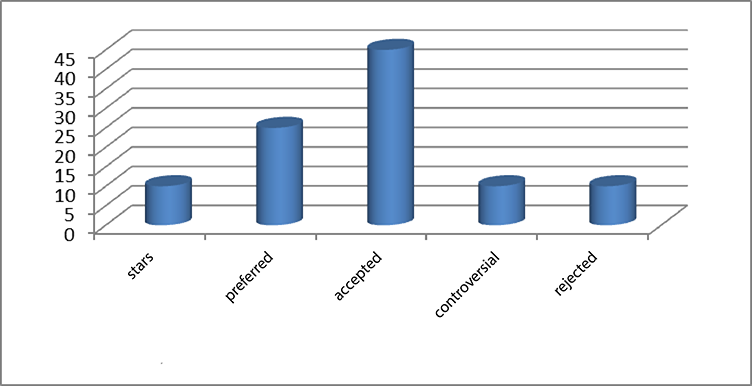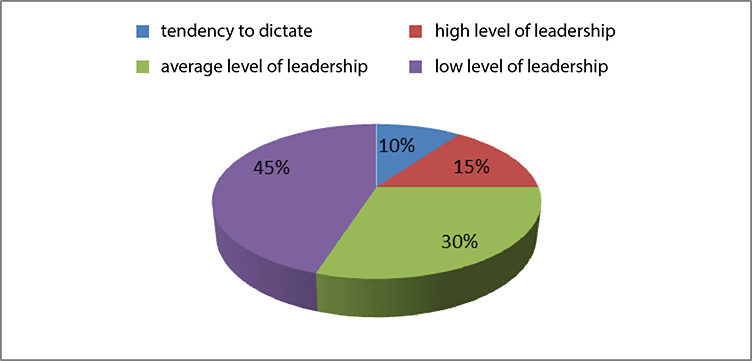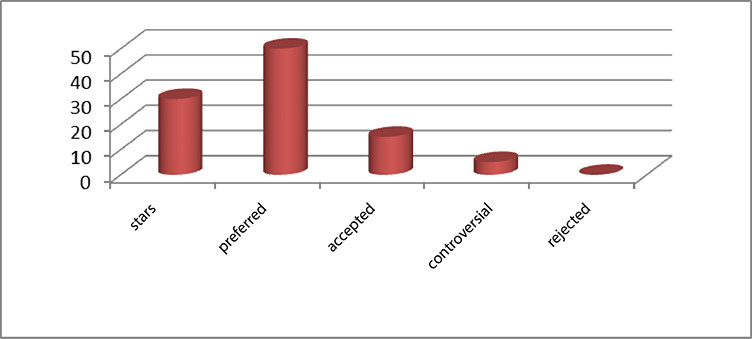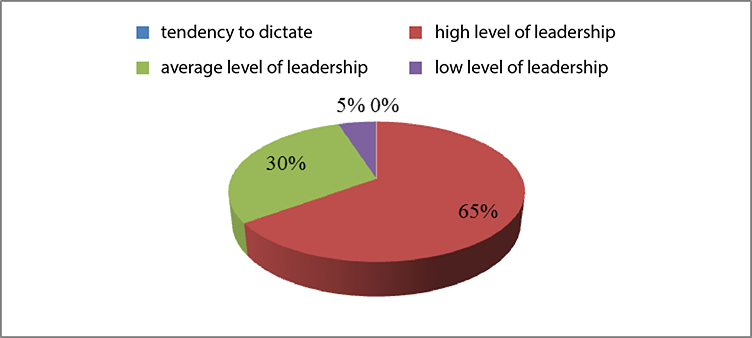Abstract
The article covers the main aspects of the influence of students' research activities on the development of leadership qualities in the implementation of uniform educational requirements. Pedagogical methods and technologies of involving modern school students in research activities in the course of cognition and social interactions deserve the most attention, since modern society needs the latest technological developments, creative ideas, effective leaders and progressive scientific discoveries that bring the economy and socio-political development of the state to the highest possible level. In this regard, in the learning process, it becomes necessary to create the same pedagogical conditions and a single educational space for the development of the personality of each school student and the formation of his/her leadership qualities. The conducted psychological and pedagogical research and detailed analysis of theoretical sources made it possible to establish that this type of educational activity contributes to the natural development of many personality traits, including the formation of leadership qualities. The formulations of leadership, its structure, factors of formation are considered as a theoretical basis. The article presents modern approaches to the methodology for the development of leadership qualities of modern school students in educational activities: scientific research, project activities, cooperative learning, etc. It also demonstrates the results of empirical research on the development of personal and leadership qualities of school students in secondary and basic schools in the course of research work.
Keywords: Leadership qualities, research activities, educational projects, social activity, self-esteem, self-development
Introduction
Modern society requires a person to be able to quickly understand a situation, make informed decisions, act confidently and purposefully, adequately assess the consequences and, if necessary, correct their actions. Meanwhile, not all people, even those who have motives, understand the goals and truly desire to achieve them, are able to become successful working alone. Whereas teamwork requires the ability to negotiate, interact, coordinate roles and tasks. In this regard, the problem of leadership as the ability not only to achieve success, but also to rally and organize a group to move towards a common goal becomes especially important (Golitsina, 2020).
It should be noted that the views of scientists on the phenomenon of leadership are ambiguous. Levchenko and Sokolova (2014) investigate this phenomenon from the standpoint of a socio-political concept based on the role of a leader in the development of society, its cultural, economic, and social improvement, highlighting that a number of scientists think that a leader is a person who is able to make responsible decisions, who uses authority and acts as a regulator of interaction in a group. They consider the concept of leadership from a philosophical standpoint, assuming that it implies the presence of a higher idea of activity and an inner ability to inspire others with this idea.
Meanwhile, most authors agree that the formation of a leader in a small or large group occurs on the basis of certain personal qualities that form in a person during childhood and develop under the influence of education and socialization (Hsu et al., 2020; Yusdi & Martinis, 2017). In this aspect, the most relevant is the need to choose and describe the psychological and pedagogical conditions for the formation of leaders in the school team.
The famous psychologist and teacher L. S. Vygotsky identified several leading principles of the organization of the educational process, which effectively form children's aspirations for leadership and the ability to lead others (as cited in Kharina, 2016). This process, according to the scientist, should be continuous and integrate educational (class), extracurricular, leisure and self-educational spheres. This process should be based on the principle of humanization of education, the use of a system-activity, personality-oriented approach in teaching and upbringing. It also should be fully consistent with the conceptual recommendations of educational standards.
Analysis of scientific literature on the problem of leadership psychology allows us to highlight a number of basic qualities inherent in a popular personality: Proactivity; creativity and research (analytical) mindset; social activity (Bubyakina, 2015).
Describing the model of social activity of a school student in the course of educational activities, Korshunova and Selivanova (2018) highlight the main criteria for successful personal development (Table 01).
At the same time, numerous studies (Baikova et al., 2018; Hutchison, 2016) show that more than half of school students associate the concept of leadership with the inequality of positions and rights. In this connection, the manifestations of leadership qualities are seen by them in the ways of subordinating peers, authoritarian imposition of their opinions, organizing various types of activities or types of entertainment under the sole undisputed leadership. Many authors (Levchenko & Sokolova, 2014; Fetiskin et al., 2006) explain this trend by the prevalence of collectivist values over individualism values in Russian society.
Meanwhile, the concept of formal (nominal, imposed) leadership is often opposed to informal leadership, which is conditioned by the sympathies of peers, trust, recognition of merits and achievements in studies, sports and other spheres. The high sociometric status of a school student in the classroom is usually associated with social approval and support, intellectual achievement and behavior (Ruiz-Bueno & Garcia-Orriols, 2019).
In addition, according to Saribeyli (2018) and some other researchers, student’s self-esteem plays an important role in the mechanism of managing the educational process. It contributes to the improvement of his cognitive abilities and the formation of critical thinking; activates self-awareness; increases interest and motivation for activities; makes the learner an independent subject of their education, which is very important from the point of view of a lifelong learning strategy.
Modern research in the field of school pedagogy proves that children who are credible and popular among their peers are most often children who are able to independently solve problems, make decisions, organize joint educational and research activities, put forward ideas, express and test hypotheses. Since research skills and a creative approach to solving cognitive problems are enshrined today in the main programs, concepts and standards of education as key competencies, the role of research behavior in the development of student leadership qualities is most relevant.
Virtue and Hinnant-Crawford (2019) note that if learners come into contact with the real world in the course of cognitive activity to explore and solve its problems, it increases their self-esteem and confidence. Such a way of education, according to the authors, ensures high performance in academic and non-academic activities. Scientists see the implementation of educational and developmental projects as the most effective means of establishing a connection with life and enhancing cognition.
It should be noted that, when planning research activities with school students, it is necessary to provide a connection with the course material, which requires careful planning and awareness by school students of the prospects for using previously acquired knowledge with an assessment criterion (Golitsina, 2020).
Hutchison (2016) notes the promising outlook and effectiveness of an interdisciplinary approach in research. At the same time, school students improve their ability for oral communication, form ethical beliefs, and develop critical thinking. Students appreciate the opportunity to work in a team, create something new and be able to bring creative ideas to their projects.
Cuesta Moreno (2019), describing the nature of leadership, notes that this phenomenon surpasses social value, since it is a product of interaction and development of intersubjective relationships, for which conceptual constructions of psychoanalysis and biology of knowledge are used. Leadership qualities act as the core that constitutes the subjectivity of the individual. It allows to establish subjective principles of interpretation that make the assessments made by other people relevant. In this regard, the creation of motivation for self-development and independent cognition plays a special role.
Research by Bueno and Garcia-Orriols (2019) showed the need to create educational models that allow for effective educational activities in the new realities of student-centered learning. The authors substantiate the need to reorient education towards the encouragement of more thoughtful, critical and self-regulatory teaching of school students based on cooperation between students, taking into account their individual characteristics.
Peurach (2016) notes the high potential for increasing the success of educational innovations through the cooperation of a researcher and a practitioner, strengthening the innovative infrastructure of the system level to support the simultaneous achievement of intellectual growth and personal improvement. According to the author, the most effective are educational systems, thanks to which our society moves forward, coordinates and uses different forms of knowledge necessary for all students to become useful, successful members of society.
The development of research skills allows not only to form solid knowledge, but also to develop personal qualities, to educate a person who is able to critically assess the process of development of society, independently seek and receive reliable knowledge and draw reasoned conclusions (Khachaturova, 2018; Pevzner et al., 2017). In the context of modern requirements, it is not so much the acquisition of ready-made knowledge by students that become paramount, but their own efforts, initiative, and search activities to discover knowledge (Semikopenko & Kamenev, 2016).
The formation of research competence is an integrative personal quality of a school student, which manifests itself in his conscious readiness and ability to engage in educational research. At the same time, according to experts (Borodina & Litvinenko, 2015; Golitsina, 2020; Levchenko & Sokolova, 2014), research activity is an element of supra-subject cognitive activity that contributes to the development of skills in goal-setting, planning, analysis of achieved results, reflection and self-esteem. Research activity is an important factor in personal self-improvement, socialization and self-development (Onetti et al., 2019).
Problem Statement
Russian and foreign authors note that the leadership qualities of modern school students in schools are insufficiently developed and require attention in the process of teaching psychological and pedagogical means for their formation (Onetti et al., 2019).
In this connection, we formulated a problem: how to form the leadership qualities of school students in the educational process as effectively as possible?
Research Questions
To disclose this problem, it is necessary to:
- Determine the essence of leadership and its role in the development and socialization of the individual at the present stage.
- Identify the factors of the social and educational situation that contribute to the formation of leadership qualities in school students.
- Reveal the potential of research activity and confirm its effectiveness in the formation of the leadership qualities of a person.
Purpose of the Study
The purpose of our research was to study the possibilities of research activities in the development of students' leadership qualities.
During the work on the topic, a hypothesis was put forward, suggesting that:
- the development of personal qualities will be facilitated by the organization of independent research;
- methods of ensuring creative subject-subject cooperation should be considered as one of the main psychological and pedagogical conditions;
- building an educational system on the basis of problem-search and research activities of school students will contribute to the maximum disclosure and development of their leadership potential.
Research Methods
To test the hypothesis and achieve the goal, the following methods were used:
- theoretical analysis of literary sources;
- empirical study of the leadership qualities of students;
- survey of teachers;
- development of a research project with the aim of formation of the students’ leadership qualities.
The main indicators of the informal leadership of school students in school can be considered: high sociometric status, developed volitional qualities, dedication, social activity, adequate self-esteem, motivation to achieve success.
On this basis, we have chosen diagnostic techniques for empirical research:
- J. Moreno's sociometry;
- Mehrabian Achieving Tendency Scale;
- diagnostics of leadership abilities by E. Zharikov, E. Krushelnitsky;
- survey of teachers.
Findings
The experiment involved 120 school students aged 12 to 17 years (50 girls and 50 boys) and 30 teachers of the State Budgetary Educational Institution of School No. 129 in St. Petersburg. The study covered 6 grades: 6, 7, 8, 9, 10 and 11. Sociometric surveys were carried out in each class separately, after which the average indicators were calculated. A survey of teachers of primary and secondary schools with the aim of identifying the influence of teenagers’ leadership qualities on the success of the development of the educational and communicative sphere was carried out.
The study of the sociometric status of teenagers showed that from 5% (in grades 6-7) to 15% (in older parallel classes) of students have the status of “sociometric stars”. The number of “preferred” children in different grades ranged from 20% to 30%. Most of the students have the status of “accepted” – 40–50%. Whereas in each class, the number of “rejected” students, as well as the number of “controversial” students, ranged from 10% to 15% (see Figure 01).

At the same time, a study using the methodology of A. Mehrabian (as cited in Fetiskin et al., 2006) showed the prevalence of failure avoidance motivation and the high importance of external stimuli in 60% of children. This indicator shows that the main motivation for school students to take part in educational activities is usually a fear of punishment or desire to obtain external benefits. Only 15% of the subjects had high indicators of intrinsic motivation for achievement, which indicates their desire for cognition, interaction, obtaining new knowledge and participation in socially useful activities. The remaining 25% of school students demonstrate an indefinite type of motivation, largely determined by the situation or personal interests.
The study of the level of development of leadership qualities according to the method of E. Zharikov, E. Krushelnitsky (as cited in Fetiskin et al., 2006) showed that the largest number of school students (45%) demonstrate a low level of expression of the ability to lead, which indicates their insecurity, indecision, fear of putting forward ideas and proposals, low social activity (see Figure 02).

At the same time, only 15% of school students who were able to actively participate in work, lead, organize and delegate responsibilities among team members turned out to have a high level of leadership. They are focused on socially useful activities and are able to realize themselves in various areas of knowledge and life. At the same time, it should be noted that in 10% of students this quality is expressed in an exaggerated form, transforming into a dictate and a desire to subordinate others to their will by any means.
A survey of teachers showed that among the leaders, 85% have high academic achievements and demonstrate emotional stability. They are not prone to conflicts and act as assistants to teachers in any situation. Whereas children prone to dictatorship, more often than not, are the initiators of conflicts and destabilize the atmosphere in the classroom. The educational and communicative activity and success of children from the group of “accepted” ones is at the average level, whereas “rejected” and “controversial” school students make up the category of “troubled kids” who are inactive in their studies and have no interest in joint activities.
A relatively small percentage of modern school students have developed leadership qualities. Such results indicate a lowered self-esteem, the presence of fears, uncertainty, anxiety, insufficient social adaptation and lack of communication skills among students. In this connection, it became necessary to select effective technologies for psychological and pedagogical support of school students for the development of their leadership qualities.
The analysis of methodological and psychological-pedagogical approaches to the formation of independence, activity and effective interaction of students made it possible to single out certain principles and techniques of research activity as fundamental means of developing leadership qualities and to develop the Creative School project. Within the framework of the project, school students were invited to develop student research miniprojects: “Fundamentals of Management”, “Modern School as a Space for Personality Development”, “Society Requirements as Guidelines for Teaching and Upbringing of Youth”, etc. In the process of organizing and managing projects, teachers coordinated and guided the work of school students. While being involved in equal creative activity, they analyzed and broadened the ideas of students, providing room for creativity and tactfully orienting them towards teaching materials. Based on the results of the Creative School project, practical recommendations have been developed aimed at the formation of leadership qualities of students and pedagogical support in organizing children's research work.
Analysis of the dynamics of the social status and personal characteristics of the volitional and behavioral spheres of school students showed that in the course of the implementation of projects, their indicators have significantly increased. There was also a positive trend in the sociometric status of teenagers (see Figure 03).

School students actively participated in research activities, acting, as a rule, as organizers of projects and generators of ideas for solving problem situations. At the same time, they successfully involved other students in the implementation of certain elements of the study, using correct methods of persuasion and explanation. As shown by a repeated study of types of motivation, motives for achieving success prevailed in 75% of school students. Whereas only 10% of children demonstrated the motivation based on the fear of failure and 15% showed an indefinite (situational) type of motivation.
Analysis of the results of repeated diagnostics of the leadership qualities of students showed that this indicator increased in the majority of them. At the same time, participation in joint research activities also contributed to a decrease in the propensity to dictate and an increase in indicators of positive interaction (see Figure 04).

In addition, a survey of teachers showed that the number of conflict situations at school has significantly decreased (by 25%) and indicators of the quality of knowledge in all subjects have significantly increased (on average – by 40%).
Comparative analysis made it possible to theoretically substantiate and experimentally prove the effectiveness of research activities in the formation and development of students' leadership qualities.
Conclusion
The analysis of theoretical sources and the study of the sociometric status of teenagers dedicated to the problem of the development of the leadership qualities of students made it possible to substantiate the importance of this personality trait for successful self-realization, socialization and the achievement of high results in educational and labour activities. For school students, the basis for the development of leadership qualities is the educational space of an educational institution. The success of future graduates in various spheres of life largely depends on the trajectory of personal and cognitive development chosen by the teaching staff and school administration.
References
Baikova, I. G., Kanchurina, R. G., & Malovichko, M. G. (2018). Ot sotrudnichestva – k kachestvu, ot uspekha – k liderstvu [From collaboration to quality, from success to leadership]. Nepreryvnoe obrazovanie v Sankt-Peterburge [Continuing education in St. Petersburg], 2(8), 34-38.
Borodina, T. F., & Litvinenko, E. V. (2015). Issledovatel'skaya deyatel'nost' shkol'nika kak factor formirovaniya ego lichnoj konkurentosposobnosti [Research activity of a school student as a factor in the formation of personal competitiveness]. Sovremennye problem nauki i obrazovaniya [Modern problems of science and education], 5, 451.
Bubyakina, A. Е. (2015). Razvitie liderskih kachestv podrostkov v processe realizacii social'nyh proektov [Development of teenagers' leadership qualities in the process of implementing social projects]. Problemy i perspektivy razvitiya obrazovaniya v Rossii [Problems and prospects for the development of education in Russia], 36, 41-46.
Cuesta Moreno, O. J. (2019). Funciones del reconocimiento en la prácticaeducativa [Functions of recognition in educational practice]. Teoria de la Educacion [Theory education], 31(1), 81-101. DOI:
Fetiskin, N. P., Kozlov, V. V., & Manuilov, G. M. (2016). Social'no-psihologicheskaya diagnostika razvitiya lichnosti i malyh grupp [Socio-psychological diagnostics of the development of personality and small groups]. Institute of Psychotherapy and Clinical Psychology.
Golitsina, C. C. (2020). Potencial obrazovatel'noj organizacii v formirovanii liderskih pozicij podrostkov [The potential of the educational organization in the formation of leadership positions in teenagers]. Bulletin of the Cherepovets State University, 2(95), 138-144.
Hsu, S., Sung, C.-C., Sheen, H.-J. (2020). Razrabotka mezhdisciplinarnogo STEM- modulya dlya uchitelej srednej shkoly: poiskovoe issledovanie [Developing an interdisciplinary bio-sensor stem module for secondary school teachers: an exploratory study]. Voprosy obrazovaniya [Educational studies Moscow], 2, 230-251. DOI:
Hutchison, M. (2016). The empathy project: Using a project-based learning assignment to increase first-year college students’ comfort with interdisciplinarity. Interdisciplinary Journal of Problem-based Learning, 10(1). DOI:
Khachaturova, K. R. (2018). Theoretical grounds of teaching in adolescence. Components of Scientific and Technological Progress, 2(36), 29-31.
Kharina, L.V. (2016). L. S. Vygotskij – osnovopolozhnik otechestvennoj defektologii [The founder of Russian defectology L.S. Vygotsky]. Molodoj uchenyj [Young Scholar], 27-1(131), 6-8.
Korshunova, O. V., & Selivanova, O. G. (2018). Individual'nyj stil' obrazovatel'noj deyatel'nosti shkol'nika v kontekste ego sub"ektnosti [Individual style of educational activity of a school student in the context of their subjectivity]. Perspectives of science and education, 5(35), 145-153. DOI:
Levchenko, V. V., & Sokolova, E. A. (2014). Metodologicheskie podhody k izucheniyu fenomena “Liderstvo” [Methodological approaches to the study of the phenomenon of leadership]. Izvestiya Samarskogo nauchnogo centra RAN [Bulletin of the Samara Scientific Center of the RAS], 16(2-3), 565-569.
Onetti, W., Fernandez-Garcia J.C., & Castillo-Rodriguez, A. (2019). Transition to middle school: Self-concept changes. PLoS ONE, 14(2). DOI:
Peurach, D. J. (2016). Innovating at the nexus of impact and improvement: Leading educational improvement networks. Educational Researcher, 45(7), 421-429. DOI:
Pevzner, M. N., Sheraizina, R. M., Donina, I. A., Petryakov, P. A., & Aleksandrova, N. V. (2017). Marketing-related activity in a heterogeneous educational organization. Revista Espacios, 38(40), 29-43.
Ruiz-Bueno, C. R., & Garcia-Orriols, J. (2019). Quénosaporta el modelo de patrones de aprendizajepara el diseño de accionesformativas? [What does the learning patterns model contribute to the design of educational actions?]. Revista Colombiana de Educacion, 77, 1-21. DOI:
Saribeyli, F. R. (2018). Theoretical and practical aspects of student selfassessment . Education and science, 20(6), 183-194. DOI:
Semikopenko, I. M., & Kamenev, V.V. (2016). Nauchno-issledovatel'skaya deyatel'nost' shkol'nikov [Research activities of school students]. Academy, 1(4), 97-98.
Virtue, E. E., & Hinnant-Crawford, B. N. (2019). “We’re doing things that are meaningful”: Student perspectives of project-based learning across the disciplines. Interdisciplinary Journal of Problem-based Learning, 13(2). DOI:
Yusdi, A., & Martinis, Y. (2017). Relationships between Lecturer Performance, Organizational Culture, Leadership, and Achievement Motivation. Foresight and STI Governance, 11(2), 92-97. DOI:
Copyright information

This work is licensed under a Creative Commons Attribution-NonCommercial-NoDerivatives 4.0 International License.
About this article
Publication Date
15 July 2021
Article Doi
eBook ISBN
978-1-80296-113-3
Publisher
European Publisher
Volume
114
Print ISBN (optional)
-
Edition Number
1st Edition
Pages
1-778
Subjects
Globalization, digital education, leadership, challenges of the time, оn-line pedagogy, universal and national values
Cite this article as:
Donina, I., Khachaturova, K., & Donina, E. (2021). Development Of Students' Leadership Qualities In Research Activities. In A. G. Shirin, M. V. Zvyaglova, O. A. Fikhtner, E. Y. Ignateva, & N. A. Shaydorova (Eds.), Education in a Changing World: Global Challenges and National Priorities, vol 114. European Proceedings of Social and Behavioural Sciences (pp. 480-489). European Publisher. https://doi.org/10.15405/epsbs.2021.07.02.57

